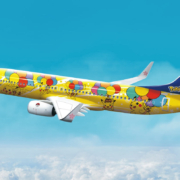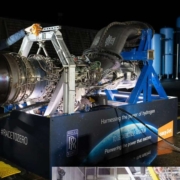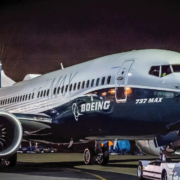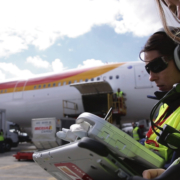It has been 4 years since the Covid-19 pandemic changed the world forever. From how the stores sell clothes to the way restaurants deliver their food, many industries experienced major changes in their workflow, and we can’t deny one of the most influenced was airlines.
With the reinforcement of traveling regulations, it seemed like air travel would be more difficult to achieve than before. But fortunately, everything turned back to normal. Well, mostly. Besides the safety protocols changes introduced by the Covid-19 pandemic, there was another factor making its way into the daily operations of an airline. We are talking about Artificial Intelligence (AI).
AI has been developing at a fast pace, being included in everything, from creating art to improving databases. But did you know it can also improve air travel? Here we’ll show you 4 ways airlines can use AI for their improvement.
Weather Forecasting

Image: cloud.google.com
Sure, airplanes move because there’s a team of pilots and assistants on them, but they depend heavily on the right weather conditions to take off. How many flights have been delayed due to storms, snow, or even strong winds? With the help of AI, airlines can now monitor weather reports in real-time, analyze data, and predict the most favorable (or unfavorable) flying conditions.
For example, Swiss International Air Lines and Lufthansa are making use of AI forecasting models developed by Google Cloud to pay attention to wind patterns that can delay or cancel flights, giving time for better planning of the schedules.
Customer Service
When we said the pandemic changed the world, we weren’t exaggerating. The need for contactless interactions was on demand, especially in places where there’s a lot of people going in and out everyday (like airports). This was a chance that AI development couldn’t let go away. Not only do we have AI-powered chatbots and virtual assistants to handle customer inquiries or provide real-time flight updates, there are also plenty of self-service check-in systems being optimized to automatize the passenger journey.
Delta Air Lines started using facial recognition technology in 2021 to identify passengers. Through the use of their app, passengers can deliver their bags and board the plane by using biometric data.
Health and Safety
Even in the post Covid era, there’s still a lot of health and safety protocols and regulations to keep in mind when traveling. AI-powered thermal scanners and facial recognition technology can be used both for contactless temperature screening and identification of passengers and crew. This helps reduce the risk of transmission (in case of sickness) and enhances the overall safety of air travel.
Route Planning
Airlines can use AI-powered algorithms to optimize flight routes. This can go from reducing fuel consumption to enhancing maintenance schedules, and anything that can improve the operational efficiency of the airline itself.
For example, Alaska Airlines partnered up with Flyways AI platform in 2021, a flight monitoring and routing tool that helps dispatchers make informed decisions and plan efficient routes. With data-based predictions and recommendations on flight operations and routing, this can help an airline to reduce miles, save fuel, and avoid creating carbon emissions.
Speaking of CO2 emissions, there are airlines like Malaysia Airlines, Atlas, Norwegian, and Air France, focusing on optimizing their fuel consumption to reduce pollution. Air France implemented Sky Breath software, an AI platform that collects flight data, performs in-depth analytics, and identifies fuel-saving opportunities to increase efficiency.
The world of AI is only starting to shine. It still requires development, better studies, and more trial and error. However, the benefits are becoming increasingly evident in the post-Covid world. From optimizing operations and improving customer service to enhancing safety measures, AI is transforming the aviation industry and helping airlines thrive in the “new normal”.
What are your thoughts on AI?






 https://www.xataka.com/vehiculos/avion-boeing-737-max-sus-dos-accidentes-fatales-cinco-meses-encienden-alertas-aviacion-comercial
https://www.xataka.com/vehiculos/avion-boeing-737-max-sus-dos-accidentes-fatales-cinco-meses-encienden-alertas-aviacion-comercial 
 https://megustavolar.iberia.com/2013/11/asistencia-en-tierra-a-un-avion/
https://megustavolar.iberia.com/2013/11/asistencia-en-tierra-a-un-avion/ 


Leave a Reply
Want to join the discussion?Feel free to contribute!